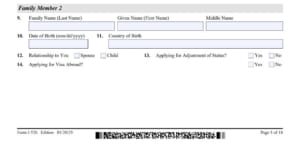On May 11, 2018, U.S. Citizenship and Immigration Services (USCIS) proposed changes in the calculation of unlawful presence for students currently studying in the United States on an F-1, J-1 and M-1 visa. The proposed changes are a result of President Donald Trump’s Executive Order: Enhancing Public Safety in the Interior of the United States and is set to take effect on August 9, 2018.
 The changes will fix specific times when foreign students in the U.S. in F, J and M visa status start to accrue unlawful presence.
The changes will fix specific times when foreign students in the U.S. in F, J and M visa status start to accrue unlawful presence.
Under the policy memorandum, unlawful presence will be calculated as follows:
1. Individuals in F, J, and M status who failed to maintain their status before Aug. 9, 2018, will start accruing unlawful presence on that date based on that failure, unless they had already started accruing unlawful presence, on the earliest of any of the following:
- The day after DHS denied the request for an immigration benefit, if DHS made a formal finding that the individual violated his or her nonimmigrant status while adjudicating a request for another immigration benefit;
- The day after their I-94 expired; or
- The day after an immigration judge or in certain cases, the Board of Immigration Appeals (BIA), ordered them excluded, deported, or removed (whether or not the decision is appealed).
2. Individuals in F, J, or M status who fail to maintain their status on or after Aug. 9, 2018, will start accruing unlawful presence on the earliest of any of the following:
- The day after they no longer pursue the course of study or the authorized activity, or the day after they engage in an unauthorized activity;
- The day after completing the course of study or program, including any authorized practical training plus any authorized grace period;
- The day after the I-94 expires; or
- The day after an immigration judge, or in certain cases, the BIA, orders them excluded, deported, or removed (whether or not the decision is appealed).
The amount of time of unlawful presence of an F-1 visa holder also carries with it different penalties. Foreign students who have accrued more than 180 days of unlawful presence during a single stay, and then depart, may be subject to three-year or 10-year bar to admission, depending on how much unlawful presence they accrued before they departed the United States. Foreign students who have accrued a total period of more than one year of unlawful presence, whether in a single stay or during multiple stays in the United States, and who then reenter or attempt to reenter the United States without being admitted or paroled are permanently inadmissible.
Those foreign students studying in the U.S. or hoping to study in the U.S. must take extra care to leave the U.S. as soon as their valid status ends to avoid the accrual of unlawful presence.
For more information, contact us at:




